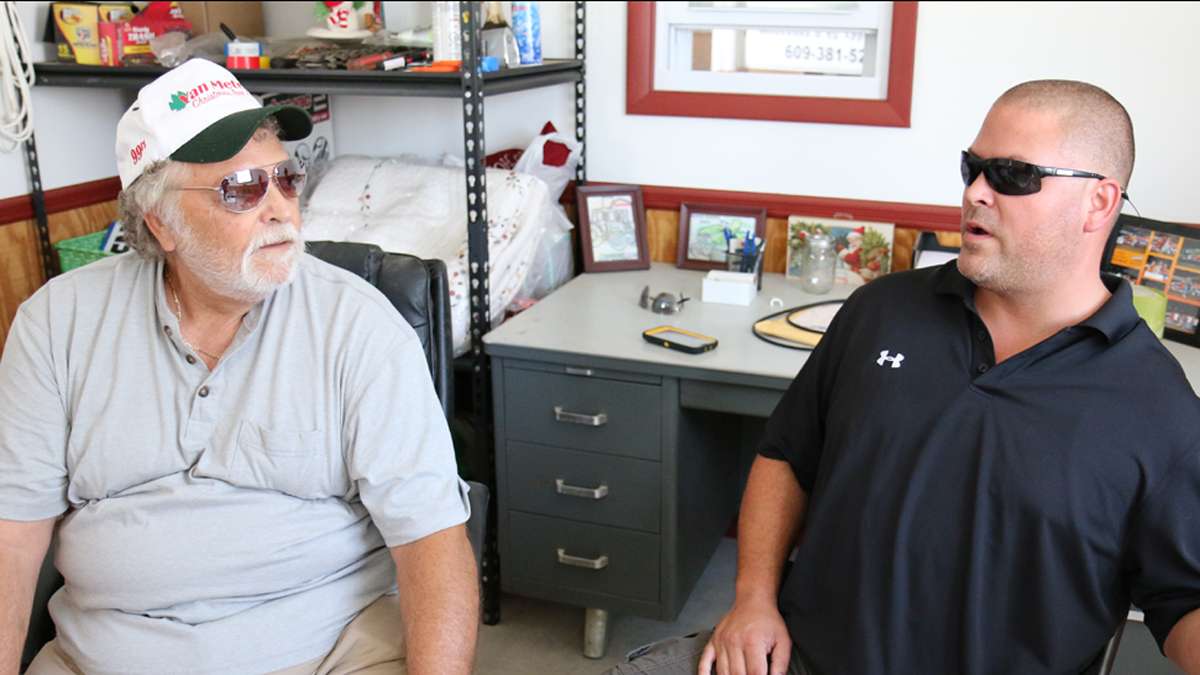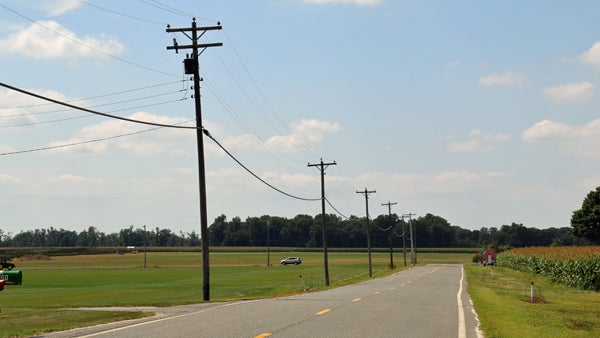Chronic telephone, Internet service issues plague rural areas of South Jersey [photos]
Listen-

Hopewell Township, in Cumberland County, filed a complaint with the state Board of Public Utilities over problems with Verizon's telephone and Internet services. (Joe Hernandez/WHYY)
-

-

-

-

-

New Jersey may be the most densely populated state in the union, but some parts of South Jersey are so rural that seems hard to believe. It’s in these rural area that some residents have complained of chronic issues with their telephone and Internet service.
Seven years ago, in the middle of the night, Jim DeJohn was awakened by the sound of two state troopers banging on his front door.
They told him his son, Joe, had been in a car accident.
“Turning the light on and seeing them standing at the door, you right away know there’s something bad,” he said. “But if they’d called on the phone it would’ve been a little different.”
Only later did DeJohn find out that the authorities had been trying to call the house. For hours.
But neither DeJohn nor his wife answered the phone, because the phone never rang.
“I think our [phone] lines was out for about two days before we even knew,” DeJohn said. “When the accident happened, that’s when we figured it out.”
Ever since the DeJohns moved in 2000 to Hopewell Township, Cumberland County, the family has had service issues with their landline phone.
The line would either fill up with static or go dead altogether for a variety of reasons: if it rained; if the county workers mowed the lawn too close to a connection box; or for no apparent reason at all.
“You feel like you’re disconnected from the rest of the world when you’re out here … if somebody was trying to get a hold of you and they can’t get a hold of you,” DeJohn said.
 Stefanie Brand, director of the Division of Rate Counsel, says there are ‘a lot of problems’ with telecommunication services in parts of South Jersey. (Joe Hernandez/WHYY)
Stefanie Brand, director of the Division of Rate Counsel, says there are ‘a lot of problems’ with telecommunication services in parts of South Jersey. (Joe Hernandez/WHYY)
‘A lot of problems in South Jersey’
New Jersey may be the most densely populated state in the union, but some parts of South Jersey are so rural that seems hard to believe. It’s in these rural area that some residents have complained of chronic issues with their telephone and Internet service.
“There are a lot of problems down in South Jersey,” said Stefanie Brand, director of the Division of Rate Counsel, the independent state agency that advocates on behalf of utility customers in New Jersey.
Residents have been complaining about deteriorating copper phone lines as well as limited Internet access and shoddy broadband service, she said.
“It’s the same as with your water or your electricity or your gas,” she said. “It’s something you need. It’s not a luxury.”
For two reasons, the responsibility for these issues has fallen on Verizon New Jersey.
Verizon became the telephone service “provider of last resort” in New Jersey — meaning it had to offer service to almost everyone who wanted it — after the telecom giant Bell System was broken up in the 1980s.
Verizon spokesman Lee Gierczynski said the company has not only wired the whole state for telephone service, but it has also continued investing in and improving its copper wire infrastructure.
“There’s a lot of anecdotes out there from customers who are having service issues, but the overall data shows that service quality in southern New Jersey is solid,” he said.
He said stories from dissatisfied customers don’t paint the full picture.
“In fact, Verizon’s trouble report rate in the area is 1.8 troubles per 100 access lines,” Gierczynski said. “And that is well below the Board of Public Utilities’ standard of 2.3 troubles per [100] access lines.”
The company’s telecommunications obligations to the state don’t end there.
Verizon is also on the hook to provide broadband Internet access throughout the state under a law passed in the early 1990s called Opportunity New Jersey, but a recent ruling from the BPU is letting the company fulfill that obligation through the older DSL service or 4G wireless Internet because the definition of “broadband” has changed vastly over the past two decades.
That is affecting residents including Tim Van Meter, who lives on a farm in Hopewell Township with his fiancee and young daughter.
Van Meter cannot get DSL access over his phone line and says Verizon told him it will not run its faster fiberoptic service FiOS to his home — even though the wires hang six utility poles away from the house. That leaves him with wireless Internet through his cell phone, which he says is both inconvenient and expensive.
“For a plan that’s gonna fit my needs — probably 300, 400 gigabytes a month — doing that over the air is gonna cost me $700. Nobody [should] have to pay that much money for the Internet,” he said. “So, it’s a tough spot, tough spot to be in.”
Like DeJohn who had access to a landline phone, Van Meter can get wireless Internet. But he says it should not be this difficult, and the quality should not be so low.
“It’s 2015 in America, in New Jersey, the most densely populated state in the country, and I can’t get Internet,” Van Meter said. “It’s just amazing to me.”
 Tim Van Meter says Verizon has refused to run its new fiber optic technology FiOS to his house, even though the wires hang only six utility poles away. (Joe Hernandez/WHYY)Seeking ‘ability to operate in the 21st century’
Tim Van Meter says Verizon has refused to run its new fiber optic technology FiOS to his house, even though the wires hang only six utility poles away. (Joe Hernandez/WHYY)Seeking ‘ability to operate in the 21st century’
Verizon offers a program for people who don’t have broadband coverage in New Jersey, but it can be difficult to qualify. You have to be without access to wired or wireless Internet from any company, and there must be 35 people living in the same census tract who don’t have Internet access for Verizon to offer it.
“We went above and beyond what Verizon was required to do [under ONJ],” said Gierczynski, who added that the company invested multiples of what was demanded by law.
He also said that increased broadband competition in New Jersey has meant more options for customers.
“There are broadband options available from wireless carriers. There’s broadband available from cable companies. And the competition from the other carriers has actually increased the broadband coverage across the state,” he said.
In Hopewell Township, telephone and Internet service quality issues got so bad that the municipality filed a complaint last year with the BPU. Even groups such as the New Jersey Farm Bureau and the state’s AARP branch have criticized Verizon for not living up to its commitments.
But residents say not much has changed. In fact, the issues may only be getting worse.
There have also reportedly been service quality complaints from residents in Burlington, Salem, and Atlantic counties.
Weymouth Township Mayor Ken Haeser faults the BPU for allowing Verizon to shirk its responsibilities.
“To give this company, Verizon, permission to abandon us makes absolutely no sense to me,” he said. “They’re supposed to be our watchdog and our protector.”
Haeser is referring to two recent BPU rulings, one that deregulated Verizon’s landline telephone service over several years and another that allowed the company to offer Internet using older, slower broadband standards and reduce its buildout in light of growing competition.
Without support from the BPU on behalf of customers, Haeser said, municipalities like Weymouth are at the mercy of Verizon.
“Right now, we’re losing faith here. We are. The people who are supposed to be out there protecting us, I don’t think they are,” he said.
The irony of the whole situation, according Brand, is that customers would be happy to pay Verizon for quality telephone and Internet service, which she said the company could provide by running FiOS to more rural areas of South Jersey.
“You would think that they would want as many customers as they can get,” Brand said, adding that residents in rural areas are not looking for a handout.
“I do think really all these towns are asking for is the ability to operate in the 21st century.”
WHYY is your source for fact-based, in-depth journalism and information. As a nonprofit organization, we rely on financial support from readers like you. Please give today.




